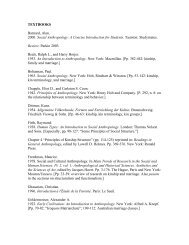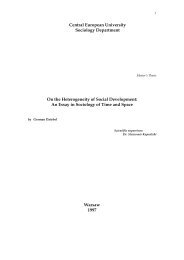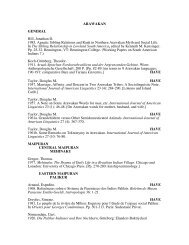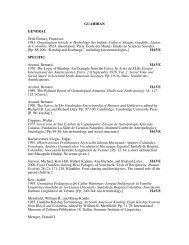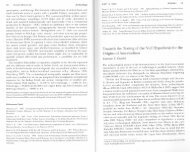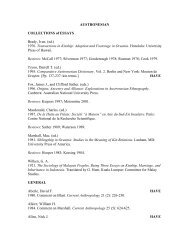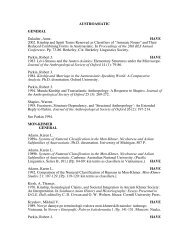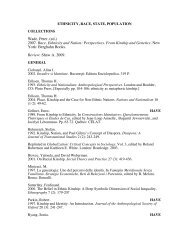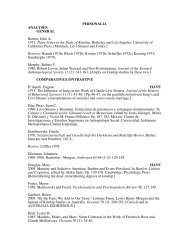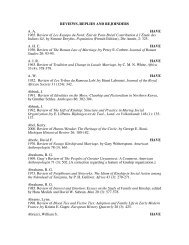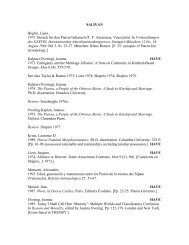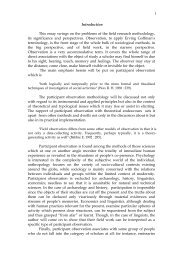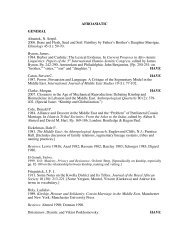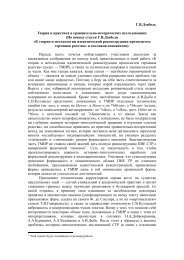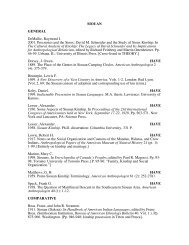- Page 1 and 2: COLLECTIONS INDO-EUROPEAN Firth, Ra
- Page 3 and 4: Beekes, Robert S. P. HAVE 1975. Two
- Page 5 and 6: Buti, GianGabriella. 1987. The Fami
- Page 7 and 8: Feist, Sigmund. 1913. Kultur Ausbre
- Page 9 and 10: 1983. The Development of the Family
- Page 11 and 12: Hermann, Eduard. 1918. Sachliches u
- Page 13: Koptjewskaja-Tamm, Maria. 2002. Adn
- Page 17 and 18: 1995. Medieval Roots of European Fa
- Page 19 and 20: Pfeffer, Georg. HAVE 2002. Comment
- Page 21 and 22: 1877. Le suffix -T-. Mémoires de l
- Page 23 and 24: 1975. Proto-Indo-European √ gem-.
- Page 25 and 26: Szemerényi, Oswald. 1964. Syncope
- Page 27 and 28: Review: Rose, H. 1954. Whittaker, G
- Page 29 and 30: in the anlaut and between vowels in
- Page 31 and 32: 1971. Heroes salvete deum genus. In
- Page 33 and 34: 1989. Toch B kwīpe ‘Scham, Schan
- Page 35 and 36: 1946. K problému lexikálnich shod
- Page 37 and 38: Todorova, Maria. 1993. Balkan Famil
- Page 39 and 40: GENERAL David, J. 1977. People of t
- Page 41 and 42: 1900), edited by David W. Sabean, S
- Page 43 and 44: 1889. Das Wiesel als Braut. Rheinis
- Page 45 and 46: 1976. Parenti, amici e vicini: Il t
- Page 47 and 48: 1999. Morphologie traditionnelle de
- Page 49 and 50: 1900. Die Gutturale im Albanesische
- Page 51 and 52: Weigand, Gustav. 1913. Albanesische
- Page 53 and 54: 1961a. Nominalkomposition in den an
- Page 55 and 56: Melchert, Craig H. HAVE 1973. Hitti
- Page 57 and 58: Oshiro, Terumasa. HAVE 1990. On Kin
- Page 59 and 60: Ss. 257-282. Heidelberg: Carl Winte
- Page 61 and 62: Hagopian, Gayaneh V. 2002. Life Phi
- Page 63 and 64: Pisani, Vittore. 1942. Armenische S
- Page 65 and 66:
1950. Die Baltischen Sprachen. Ihre
- Page 67 and 68:
1922. Kalba ir Senovė. Kaunas: Šv
- Page 69 and 70:
Fälle. 2. sesuo motė . Indogerman
- Page 71 and 72:
Dhonnchadha, Márín Ní. 1986. Ina
- Page 73 and 74:
Pryce, Huw. 1993. Native Law and th
- Page 75 and 76:
1978. The Stem Family in Ireland. C
- Page 77 and 78:
1964. Fosterage. Schweizerisches Ar
- Page 79 and 80:
1909. Zur deutschen Etymologie. III
- Page 81 and 82:
2005. Friends and Relatives in Need
- Page 83 and 84:
WEST ENGLISH ANCIENT COLLECTIONS Wh
- Page 85 and 86:
Lynch, Joseph H. 1998. Christianizi
- Page 87 and 88:
McCracken, Grant. 1983. The Exchang
- Page 89 and 90:
1982. The ‘Marriage with a Deceas
- Page 91 and 92:
Finch, Janet. 2004b. Inheritance an
- Page 93 and 94:
Lambek, J. 1986. A Production Gramm
- Page 95 and 96:
1968. Altfriesisch swāger. Indoger
- Page 97 and 98:
Wortschätzen = Lexicology: An Inte
- Page 99 and 100:
Much, R. 1923. Oheim. Zeitschrift f
- Page 101 and 102:
MODERN GENERAL Barth, Dieter. 1975.
- Page 103 and 104:
Helmig, Thomas. 1984b. Eine “stie
- Page 105 and 106:
Review: Hagen 1992; Koepping 1999.
- Page 107 and 108:
1999. The Origins of Old Germanic S
- Page 109 and 110:
Gutenbrunner, Siegfried. 1942. Der
- Page 111 and 112:
Dahlstedt, Karl-Hampus. 1963. Trois
- Page 113 and 114:
GREEK COLLECTIONS OF ESSAYS Avezzù
- Page 115 and 116:
1984. Graphes et réseaux de parent
- Page 117 and 118:
1991. The Use of Kinship Terminolog
- Page 119 and 120:
Humphreys, Sally C. 1986. Kinship P
- Page 121 and 122:
Locker, Ernst. 1933. Die Bildung de
- Page 123 and 124:
1983. Phratries et ‘kômai’ d
- Page 125 and 126:
1968. The Glory of Hera: Greek Myth
- Page 127 and 128:
Wilgaux, Jérôme. HAVE 2000a. Entr
- Page 129 and 130:
Herzfeld, Michael. HAVE 1983. Inter
- Page 131 and 132:
1964. Honour, Family, and Patronage
- Page 133 and 134:
Trost, Paul. HAVE 1938. Ai. aw. str
- Page 135 and 136:
Kretschmer, Paul. HAVE 1930. Altind
- Page 137 and 138:
1960. Indo-Arica IV: Sanskrit śvā
- Page 139 and 140:
Gould, Harold A. 1963. A Comment on
- Page 141 and 142:
Trivedi, H. R. HAVE 1954. Some Aspe
- Page 143 and 144:
Karve, Irawati. HAVE 1943-1944. Kin
- Page 145 and 146:
2005. Ritual Impurity and Kinship i
- Page 147 and 148:
Mayne, John D. 1887. Hindu Law in M
- Page 149 and 150:
Fruzetti, Lina, and Akös Östör.
- Page 151 and 152:
Mukherjee, B., B. C. Roy Choudhury,
- Page 153 and 154:
WESTERN PAHARI GADDI Kapila, Kriti.
- Page 155 and 156:
Pieris, Ralph. HAVE 1964. Vedda and
- Page 157 and 158:
Yalman, Nur. 1965. Dual Organizatio
- Page 159 and 160:
Pandharipande, Rajeshwari. 1997. Ma
- Page 161 and 162:
Grierson, George A. 1969 (1906). Th
- Page 163 and 164:
DOMAAKI Lorimer, D. L. R. 1939. The
- Page 165 and 166:
1998. Die Sprache von Nisheygram im
- Page 167 and 168:
Behnam, D., and S. Scott. 1971. Nuc
- Page 169 and 170:
TAT Yar-Shater, E. 1969. Distinctio
- Page 171 and 172:
Khatib-Chahidi, Jane. 1992. Milk Ki
- Page 173 and 174:
1974. Social Organization of a Noma
- Page 175 and 176:
1958. Una nuova iscrizione messapic
- Page 177 and 178:
Franciosi, Gennaro. (ed.) 1984. Ric
- Page 179 and 180:
Reviews: Pollard 1992; Treggiari 19
- Page 181 and 182:
1972b. Remote “Uncles” and Remo
- Page 183 and 184:
Derouet, Bernard. 1990. L’aristoc
- Page 185 and 186:
Franciosi, Gennaro. 1989. Famiglia
- Page 187 and 188:
Hopkins, Keith. 1990. Seven Missing
- Page 189 and 190:
Luján Martinez, Eugenio R. HAVE 19
- Page 191 and 192:
1990. Adfinitas. La parenté pa all
- Page 193 and 194:
1982. Épouses et familles de magis
- Page 195 and 196:
1900. Etymologies of Some Latin Wor
- Page 197 and 198:
Reprinted in: Scritti Giuridici: Fa
- Page 199 and 200:
Reprinted in: Scritti Giuridici: Fa
- Page 201 and 202:
Westrup, Carl W. 1926. Quelques Obs
- Page 203 and 204:
Reprinted in: Gesammelte Schriften,
- Page 205 and 206:
Amado, Claudie. 2004. La Famille No
- Page 207 and 208:
Blochwitz, Werner. 1963. Die lexika
- Page 209 and 210:
1900. Histoire de l’Autorité Pat
- Page 211 and 212:
1995. Parents, grands-parents et pa
- Page 213 and 214:
Zonabend, Françoise. 1981. Les tr
- Page 215 and 216:
Anthropological Society of Oxford 2
- Page 217 and 218:
Mikelarena, F. 1992. Estructuras fa
- Page 219 and 220:
2000. The Politics of Ritual Kinshi
- Page 221 and 222:
1992. “Famiglie vecchie e parenti
- Page 223 and 224:
1994. Fratelli d’Italia. Fraterni
- Page 225 and 226:
1991. Kinship and Contract: Propert
- Page 227 and 228:
1961. Yn legeture ku petrunderia el
- Page 229 and 230:
1993. Do madre in figlia, di padre
- Page 231 and 232:
2002. Neues zu „Slavisch st aus
- Page 233 and 234:
Mikkola, J. J. HAVE 1908. Zur slavi
- Page 235 and 236:
Stankiewicz, Edward. HAVE 1958. Sla
- Page 237 and 238:
Čangova, P. 1996. Bъlgarski rodov
- Page 239 and 240:
1927. Słow. nevěsta. Prace Filolo
- Page 241 and 242:
1996. Naming the House and Naming t
- Page 243 and 244:
1983. A Large Family: The Peasant
- Page 245 and 246:
Timberlake, Alan. 1993. Russian. In
- Page 247 and 248:
Hammel, Eugene A. 1980. Household S
- Page 249 and 250:
Filipović, Milenko S. 1976. Zadrug
- Page 251 and 252:
Humanističke i Društvene Znanosti
- Page 253 and 254:
Georgiev, Vladimir I. 1977. Trakite
- Page 255 and 256:
Reuter, J. N. 1934. “Tocharisch
- Page 257:
1985. Tocharian B soy, A se and Rel



